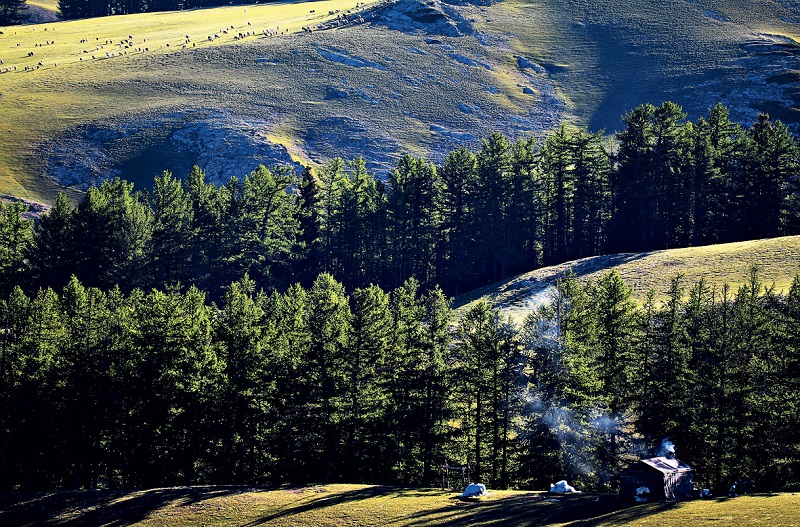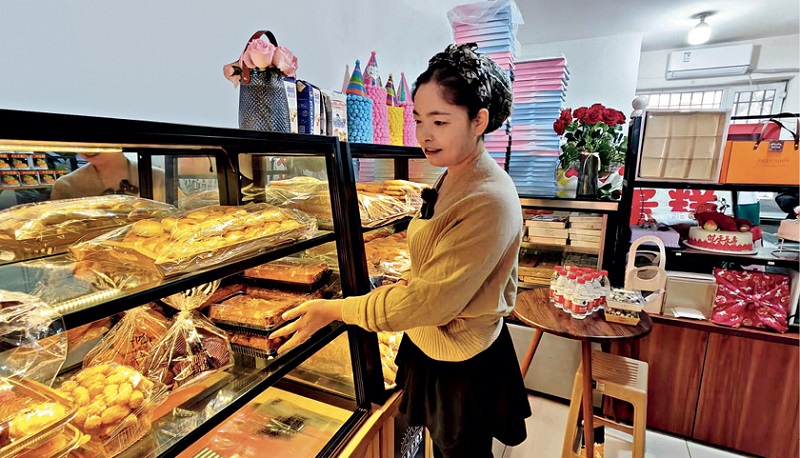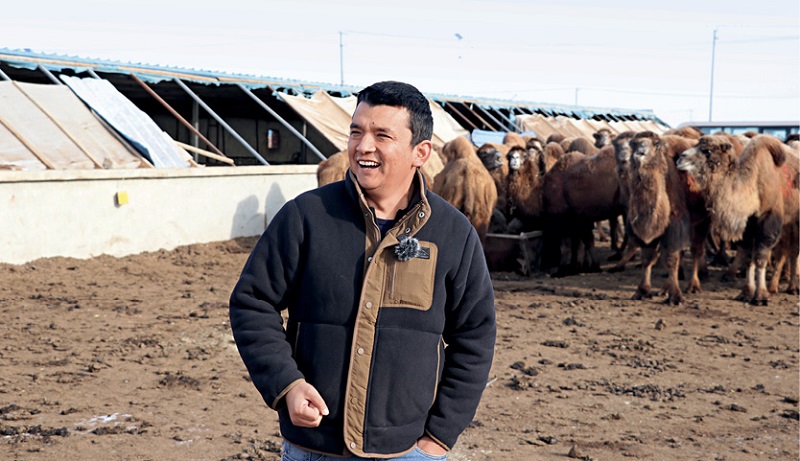Xinjiang has effectively safeguarded the basic rights of people of all ethnic groups to work and employment, and made great strides in economic and social development, thus significantly improving people’s livelihoods.

A view of Nailengel Grassland, in Yiwu County, Hami City, Xinjiang Uygur Autonomous Region.
Located in the central region of Eurasia, Xinjiang Uygur Autonomous Region in northwest China has been inhabited by many ethnic groups since ancient times. The Chinese government in recent years has adhered to the people-centered principle and vigorously promoted Xinjiang’s development. The basic rights of the people of all ethnic groups in Xinjiang, including their rights to work and employment, have been effectively safeguarded. Great strides in economic and social development have also been made, significantly improving people’s livelihoods.
People of all ethnic groups live in harmony, and the youth pursue happiness through work in a down-to-earth manner.

Ma Xiumei is introducing the variety of pastries she sells at her dessert shop in the Ankang Community in Xishan Agricultural and Pastoral Area.
Common Prosperity
In the Zhonghe Specialized Camel Breeding Cooperative in Xiamaya Township of Hami City, Nueraili Kasimu and his coworkers are busy handling grass and milking. "Our cooperative produces more than 300 kilograms of camel milk every day, and the gross income is over RMB 10,000,” he said. “Baby camels, pregnant camels, and lactating camels are specially cared for in this 3,000-square-meter breeding base. The others are kept in a free-range manner in the Gobi Desert nearby. All the livestock is treasured by the cooperative," explained the young Uygur.
As more and more people know the nutrition of camel milk, camels, also referred to the “ships of the desert,” have seen their commercial value increase in recent years. Many herders in Xiamaya Township used to raise a few camels as sideline business, but due to a lack of relevant breeding experience, free-range camel breeding did not bring a stable income to locals a few years ago.
With a mindset of trial and error, Nueraili's father founded the cooperative in 2014, but it yielded poor economic returns due to its small scale. Nueraili quit his job at a new energy company and took over the cooperative in 2018. Back then, the cooperative had merely 150 camels. After several years of development, it now cooperates with more than 130 households and raises over 900 camels, and the annual dividends handed out to participating herders alone can hit the RMB 500,000 mark. “Camel breeding in Xiamaya Township has finally moved on from free range to large scale,” Nueraili said proudly.
Some herders used to raise camels in a free-range way, and were not well-acquainted with how to deal with the various illnesses that commonly afflict their livestock. Sometimes they would also lose camels to attacks by packs of wolves.
After the founding of the cooperative, the herders entrust the camels to the cooperative with insurance, and annually receive a dividend of RMB 1,000 per camel. Keremu Wuji, a 60-year-old herder, has his 20 camels raised in the cooperative. He also works for the cooperative and earns a monthly salary of RMB 4,000. Even though he is of retirement age, he is in good health and wants to continue working.
Nueraili admits that the operation of the cooperative was not always a smooth sailing. To scale up to an industrial level, sometimes financial difficulties would appear. Fortunately, the government provided a variety of subsidized loans to help small rural businesses address urgent financial needs. The government also gave a subsidy of RMB 300 per ton for the purchase of camel fodder, and RMB 3 for each kilogram of camel milk sold.
Starting out as a layman regarding camel raising, Nueraili has become a well-known expert in the township. He has seen his life become increasingly prosperous and was sincerely thankful for the country’s policies. “The government often provides us with various supportive policies, and regularly sends animal husbandry experts to give guidance, so that we can learn methods of scientific breeding and management. The production of camel milk has also increased,” he said.
"The change is too great. My life has become better, and I can get rich with my fellow villagers. I think life is very meaningful."
Getting A Better Life
Opened in 2021, Zhangshang Dessert Shop is popular in the Ankang Community in Xishan Agricultural and Pastoral Area. The owner Ma Xiumei is busy baking a variety of pastries every day early in the morning. Two years ago, she was a housewife with no self confidence, no income, and no prospects. “I am especially grateful for the help of the women's federation in our community, which helped me start the business. My life is really getting better,” Ma said.
To help women seek employment, Ankang Community has built an employment platform in recent years , not only providing job opportunities, but also regularly holding free skills training courses according to different needs. The training courses covered pastry making, elderly care, and housekeeping services among a wide range of skills. The platform so far has helped more than 100 women to start a business or find a job.
Ma learned Western-style pastry baking and confectionary skills through the training program. When the women's federation suggested that she start a business, she knew she lacked the confidence and the required start-up capital. The women's federation helped her find a storefront, apply a business license, and get an interest-free loan of RMB 50,000.
After its opening, she took training sessions on business management organized by the community. The business has gradually boomed, with a monthly income of over RMB 10,000. "I have better financial conditions, and more importantly, I feel worthy and have more friends, and my family is more harmonious,” Ma said. She also helped more than a dozen housewives to learn baking skills, and some of them have opened their own stores independently.
Later on, she received e-commerce training in Hangzhou, which was also arranged by the community. Transportation, accommodation, and other training expenses were all paid by the community. "I just got another interest-free loan of RMB 50,000 to renovate and upgrade the store. After that, I will sell pastries by livestreaming on e-commerce platforms, and I will share these experiences with others,” Ma excitedly shared her future plans.

Nueraili Kasimu is a well-known camel breeding expert in Xiamaya Township of Hami City. Photo courtesy of Wang Ziteng
Promising Prospects
Mukedansi Yahefu, a 30-year-old Uygur girl, used to live in Bositan Village, Hami City. Her family of six grew jujubes and grapes for a living. "At that time, our income was low and unstable, and life was very hard," she recalled.
With poverty alleviation policies, her family moved to Hami’s Eastern Suburbs Development Zone to start a new life in 2019. Graduating from Northwest Minzu University in the same year, she worked at a local asset management company thanks to the favorable local employment policy for graduates. Her father worked as a security guard for the Eastern Suburbs Development Zone, and her mother also got a job on the community landscaping unit.
"Now my parents' monthly income almost equals the amount they earned from farming in a year," said Mukedansi. The company she works has 248 employees, 143 of whom are from ethnic minority communities. According to the needs of different employees, the company regularly holds a variety of training sessions, covering language, breeding skills, safety production, and scientific management. In the past four years, she has grown from an entry-level employee to a veteran in a core position, and is now responsible for production data recording.
“I like what I do, and I can see bright development prospects in the future,” she said. Her company offers many supporting facilities, such as dormitories, canteens, gyms, and bathrooms.
On festivals, the company organizes a dinner party, and colleagues of different ethnic groups get along very well. In addition, the company treats employees equally in terms of wages, insurance, and other benefits. With her legitimate rights and interests fully protected, she feels very comfortable working there.